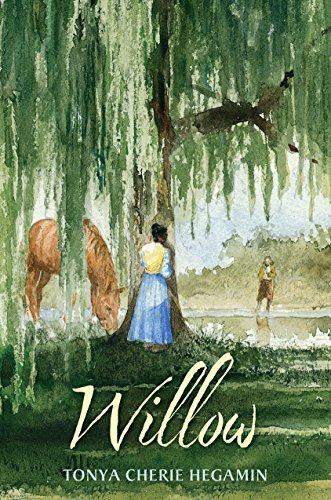
LitPick Review
Willow
Standing just a few lengths from the south side of the infamous Mason-Dixon Line, there lays the charming plantation of Knotwild, owned by the upstanding Reverend Jeff and worked by his well-treated slaves, whom he rules with a gentle hand and a kind heart in the fall of 1848. One of the reverend’s closest and most loyal servant’s daughter, Willow, has lived there all her life, standing by the river, writing letters to her dead mother, making sleeping draughts for her worn Papa, and staring at white stone marker in the distance, promising a dangerous freedom to anyone who crosses it. She believes herself content there, until a rogue freeman named Cato limps into her life. Tired, afraid, and injured Cato begs Willow’s help and secrecy. Communicating through her journal of letters, the two begin to fall in love. Soon, Willow begins to question everything she’s ever known—her captivity, her master, her future—and, when the Reverend makes some big changes around the plantation, Willow can’t help but wonder what would happen if she leaves with Cato and crosses that thin line between freedom and slavery. The Mason-Dixon is there—it all depends if Willow is willing to leave everything behind the quest for true liberty.
“I examined each one of the pages to see if they had any marks, pausing at that first command……RUN.”
Opinion:
This book was a disappointment for me, personally. I feel like Hegamin can and has capitalized on the potential to become a great author before, but this book was a novice work of hers for sure. Awkward sentences, underdeveloped characters, below-par vocabulary. I felt like most of the book was exposition and building tension toward the climax, which turned out to be utterly predictable and rushed. You knew within the first ten pages what was going to happen in the end—the other 350 pages were just pomp and circumstance, some parts completely irrelevant to the story. And once the climax came, it was resolved in 5 pages or less—plotlines either tied off or severed within a sentence. The characters were hard to connect with—I could barely stand Willow at all! She seems self-centered and horribly wishy-washy and immature. And her whirlwind romance with the elusive Cato—bah. They fall in love within a couple of one-line sentences betwixt each other in a hidden journal, and when they finally meet, they are willing to give up anything to be with each other, no matter whose head they have to step on. Revolting, really. All in all, an unsatisfactory and dispassionate book that I felt could have been better.
“The man shook Cato’s hand; it took the rest of Cato’s strength before his vision was once again consumed with darkness.”
I would recommend this book for ages seven and up, as it is a clean read and only has a very mild expletive or two. The vocab, as I said above, is very easy to understand, also.
When Cato begs Willow’s help and offers her freedom, she is faced with a choice—will she accept his offer, or stay rooted to her home in Knotwild, always wondering what could have been? Tonya Cherie Hegamin has the answers in her new novel, Willow!

